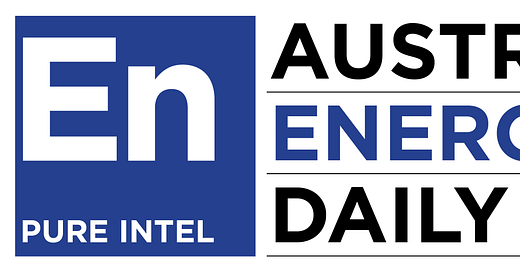Day 93: 'Extraordinary and interventionist powers'
An introductory weekday newsletter from Schwartz Media. Counting the days since Australia had an energy policy.

Good morning and welcome to day 93.
Today in summary: The government’s draft divestiture law has leaked, and its critics say it’s being rushed through; Labor hints further at its energy policy, to be announced Thursday; and Victoria’s Labor to ban cold-calling and door-to-door sales from energy companies.
— Sophie
Today’s policy spin level: 💨💨💨💨
Please don’t keep Australian Energy Daily to yourself. Forward this email to your colleagues and encourage them to sign up for free here.
A leak of the draft law sought by the government to allow it to force energy companies to sell assets would give “vast new powers” to the Treasurer, Fairfax reports. The Morrison government announced its planned divestiture powers in October as part of its ‘big stick’ regulation to force retailers to cut prices. Fairfax says the draft law would allow divestiture after the ACCC had ruled on prohibited conduct by a retailer, which would give the Treasurer grounds to issue an order when it:
“‘will result, or is likely to result, in a benefit to the public’. If the order will result in a detriment to the public, the draft laws states that the benefit must outweigh that detriment. Those subject to the order would have to take court action to block the Treasurer’s decision.”
The government is asking for submissions this week on the law, which will be put to a vote after Parliament resumes next week. The Australian reports shadow Treasurer Chris Bowen as criticising the swiftness of the process, with his Treasury spokesman saying:
“Industry are complaining to Labor that the Liberal Party is trying to rush through major powers for a treasurer to break up big businesses. This is a secret and rushed consultation over the most extraordinary and interventionist powers in the economy for generations.”
Federal Labor, whose energy policy announcement is coming on Thursday, says it can cut emissions and power prices simultaneously. At a low carbon forum in Adelaide yesterday, Fairfax reported shadow energy minister Mark Butler said:
"The idea that there is this false choice and you have to pick, I think reflects the poor, immature nature of the debate here in Australia."
"At a time where we simply have to renew our ageing electricity infrastructure, much of which was built in the 1960s and 1970s, replacing it with renewable energy is going to be the cheapest way to guarantee energy through the future.”
Victorian Labor will ban energy companies from using door-to-door and cold-calling sales tactics and double the penalty for wrongful disconnection if re-elected. Fairfax reports that Labor will announce the promises, part of its “Energy Fairness Plan”, today, alongside beefing up the Essential Services Commission to investigate and prosecute energy retailers.
The Commentariat
Australia’s coal companies are calm about China suspending imports in some part of the country, writes Matthew Stevens in the AFR.
“This winter-time interruption to historical Chinese demand patterns is the way of the future and not even speculation that the southern province of Fujian might yet lock its gates to coal imports or that the suspensions could selectively extend beyond the end of the year and into the Chinese New Year could shift the coal export sector's dial from alert but not alarmed.”
Elizabeth Minter, a financial counsellor at the National Debt Helpline, writes that recent changes to the way energy retailers must behave towards customers in hardship in Victoria should be adopted nationwide.
“If they are prepared to sign up to better practices as part of their social licence to operate in Victoria, why can’t they do the right thing and adopt the same practices for all their customers, wherever they live in Australia?”
Three more things
AGL has conceded that their proposal to address the shortfall in LNG with overseas imports would significantly increase greenhouse gas emissions. AGL’s argument is that despite the process of producing, processing and transporting foreign LNG leading to a 20% increase in emissions to the same amount of gas extracted in Australia, emissions will ultimately be reduced due to the drop in LNG prices that will result, expediting the replacement of coal plants with renewables.
Woodside Petroleum’s ongoing Browse LNG project has been put to the Commonwealth for approval for the third time in a decade. In its current form, the proposal consists of a 900km gas pipeline which would pump gas to the North West Shelf LNG plant for up to 50 years.
Origin Energy will take its energy demand shifting AI software to a national level, after trials in Adelaide proved successful. The bot diminishes spikes in price by shifting electrical demand around to different parts of the day. According to Origin, the bot assists customers running plant - such as industrial air conditioning units - to run more flexibly by correctly anticipating price surges and putting non-critical load into cheaper slots.


